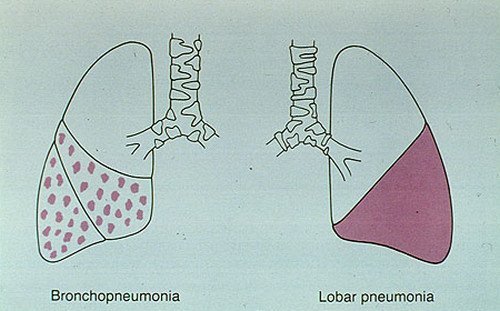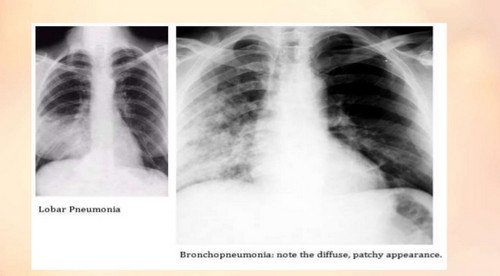Bronchopneumonia
Last reviewed by Dr. Raj MD on January 12th, 2022.
What is Bronchopneumonia?
It is a severe inflammation of the walls of the bronchioles. It is a type of pneumonia, but acute in nature and warrants a different type of medical treatment.
Other terms for bronchopneumonia are bronchial pneumonia and bronchogenic pneumonia.
Pneumonia is classified into two: lobar pneumonia and bronchopneumonia. Lobar pneumonia affects a section or more sections or lobes of the lungs. On the other hand, bronchopneumonia affects both the bronchi and the lungs. (1, 2, 3)

Image 1: A comparison image between bronchopneumonia and lobar pneumonia.
Photo Source: www.primehealthchannel.com

Picture 2: An x-ray film of patient with bronchopneumonia. In the film, you will notice a diffused patchy appearance.
Image Source: image.slidesharecdn.com
Pathophysiology
The transmission of bronchopneumonia is caused by bacteria. You will get bronchopneumonia if the bacteria causing the disease enter the lungs. The two causative agents are Staphylococcus aureus and Pseudomonas aeruginosa. The bacteria travel to the lungs and infect the pulmonary lobes.
The mucus produced by the lungs will fill the alveolar sac, which results to consolidation. The airspace is reduced because of the build-up of mucus inside the lungs. The patient will have a hard time breathing leading to shortness of breath and labored breathing. (3, 4, 5, 6)
Bronchopneumonia Causes
Viruses and bacteria are the two main causes of bronchopneumonia. The very strain of virus that causes colds and flu. Examples are Staphylococcus aureus, Haemophilus influenza, and Klebsiella pneumonia. (4)
Is bronchopneumonia contagious?
Bronchopneumonia is contagious. It can be passed on from one person to another through direct contact and droplets. (5)
Who are susceptible?
- Children 2 years old and below.
- Geriatric population, especially those 65 years old and above.
- Those patients with lung-related diseases such as asthma, chronic obstructive pulmonary disease, and cystic fibrosis.
- Those people with weak immune system, especially those taking immunosuppressive medications and undergoing chemotherapy.
- Patients with HIV or AIDS.
- People who are a heavy smoker/chronic smoker.
- Those who are on a ventilator.
- People with diabetes mellitus, heart disease, and other forms of chronic disease.
- Those people who have difficulty coughing and swallowing.
- Those who have a history of chronic alcohol abuse. (6, 7)
- People who are malnourished.
Bronchopneumonia Symptoms
- Fever
- Productive cough
- Shortness of breath
- Chest pain
- Sweating and chills
- Rapid breathing
- A headache and muscle ache
- A feeling of fatigue and restlessness
- Delirium and confusion, especially in older patients. (4, 8, 9)
Diagnosis of bronchopneumonia
The doctor will conduct a thorough physical examination. He will listen to your lungs using a stethoscope. The chest will also be checked for any abnormalities. Your breathing will be thoroughly assessed. Aside from physical examination, the doctor will also order for CBC to find out if there is an infection.
The best way to diagnose the presence of bronchopneumonia is through chest x-ray. It uses an electromagnetic radiation to take a photo of the chest and lungs. Through x-ray, the doctor will be able to detect the extent of bronchopneumonia. If you are extremely ill, the doctor will order another test called CT scan. It is similar to that of the x-ray but CT scan gives a more detailed information. It points out the area of infection in the lungs.
Other tests include sputum culture test to find out the cause of infection and bronchoscopy to look at the structure of the bronchial tubes. In rare instances, a pulse oximetry is needed to measure the amount of oxygen in the blood. This helps the doctor assess the severity of infection and the ability of the body to absorb oxygen. (2, 4, 9, 10)
Bronchopneumonia Treatment
If the infection is viral in nature, it does not require medical treatment. The condition of the patient will eventually improve in a matter of a week. What the doctors usually do is they do their best to improve the symptoms of the patient and reduce the length of the illness. The doctor will include antivirals in the nursing management of bronchopneumonia.
If the cause of bronchopneumonia is bacteria, the doctor will prescribe the appropriate antibiotics. Within three days of taking antibiotics, the patient’s condition will improve significantly. To prevent the condition from recurring, the patient should complete the entire course of antibiotics. For symptomatic relief, the doctor will prescribe antipyretic for fever and mucolytic and expectorant for a cough. (2, 5, 6, 7)
Home management for bronchopneumonia
- The patient should rest and drink plenty of warm fluids.
- The patient should take healthy and nutritious foods to strengthen the immune system.
- Using a humidifier can significantly improve the condition of the patient.
When should you call out for medical help? - If you are a geriatric patient (65 years old and above) and you are having a hard time breathing.
- When your blood pressure drops and your breathing is rapid.
- When you need breathing assistance.
- When you are restless and confused. (1, 2, 6, 8)
What can you do to prevent bronchopneumonia?
- Vaccination is the key to prevent bronchopneumonia. The patient should receive a flu shot every year. A pneumococcus vaccine gives you a five-year protection. It is recommended for patients 65 years old and above. For children under two years old, a pneumococcal conjugate vaccine should be given.
- Make it a habit to wash your hands regularly.
- Quit smoking. Avoid exposure to second-hand smoke.
- Drink alcoholic beverage in moderation.
- Limit your contact with sick people.
- Lead a healthy lifestyle. (2, 4, 5)
What are the complications of bronchopneumonia?
- Chronic pneumonia/recurrent pneumonia
- Septic shock
- Pleura damage such as pleural effusion, pleurisy, and emphysema.
- Cardiovascular-related disease
- Respiratory-related disease
- Acute renal insufficiency secondary to dehydration (2, 5)
What is the prognosis for bronchopneumonia?
The prognosis is good if the patient will strictly adhere to the treatment plan prescribed by the doctor. It would take like four to six weeks for the patients to fully recover from the illness. The age and overall health condition of the patient play a huge role in the overall prognosis. Usually, the patient will be hospitalized if he/she suffers from acute bronchopneumonia along with dehydration and weakness.
Majority of the patients have a complete recovery after two weeks of religious treatment. If an elderly patient or too young patient gets bronchopneumonia and will not receive the proper care, eventually the patient will die. Hence, it is important for the patient to receive the right medical treatment. Live a healthy lifestyle and get yourself vaccinated. Always remember that prevention is better than cure. (1, 2, 4, 8)
References:
- https://www.aarpmedicareplans.com/health/bronchopneumonia
- https://www.healthline.com/health/bronchopneumonia
- https://radiopaedia.org/articles/bronchopneumonia
- http://www.tandurust.com/general-health/bronchopneumonia-remedy.html
- http://myhealth-guide.org/bronchopneumonia-causes-symptoms-treatment/41
- http://www.pathologyatlas.ro/bronchopneumonia-lobular-pneumonia.php
- http://www.ehealthstar.com/conditions/pneumonia/bronchial
- https://www.doctorshealthpress.com/general-health-articles/bronchopneumonia-treatment-causes-symptoms-diagnosis/
- http://hellomrdoctor.com/bronchopneumonia/
- https://www.mayoclinic.org/diseases-conditions/pneumonia/diagnosis-treatment/drc-20354210